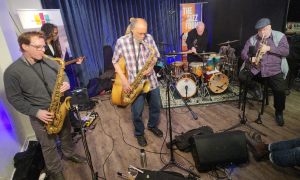Home » Jazz Articles » Live Review » Ethno Port 2022
Ethno Port 2022

Courtesy Maciej Kaczyński
Centrum Kultury Zamek
Poznań, Poland
June 11-12 2022
The three-day Ethno Port festival moved back to its natural month of June in 2022, following a September edition in '21. Your scribe only managed to arrive for the second and third days, but still caught a wide array of artists, split between the Zamek Cultural Centre's Grand Hall and its open air Castle Courtyard. As ever, there was a heavy Polish folk presence, but also a strong contingent of forcibly-displaced Ukrainian bands. Another distinct element was the multiple presence of North African and Middle Eastern acts. Ethno Port continues to present artists who don't stint on a marked traditional content, and any fusion activities are usually on the extreme wild-garden perimeter, rather than lolling complacently on the living room coffee table.
Saturday's outstanding ensemble arrived right at the beginning, with the Egyptian singer Rashida Sayed, representing the minority community of the Dom. Sayed also plays the dof, a large frame drum (with metal rattlers), along with fellow vocalist and percussionist Emed Shahin. The band's other three members play darabouka goblet drum, rababa (two-stringed fiddle) and arghoul (reed-flute). That line-up might sound subtly acoustic, but their reality held a formidable sonic power. An instrumental opened up, with Sayed singing on the second number, immediately imposing an exaggerated mood of invocation. Shahin elaborated vocally, intensifying the song. Sayed took a solo part on her dof, then swirled around the stage, as the pace quickened sharply. The audience were already captured, clapping along naturally, and without much stage direction. Group vocals built across the line of players, and at 5pm there was already a massive amount of energy radiating around the castle walls, the set building up into a sustained sense of revelry.
The six-piece Ukrainian vocal group Drewo are well-known folk veterans in their homeland, with one of their number sometimes playing his fiddle. Their songbook was full of fleet and grainy material, often with a generally Balkan feel to its melodies. This Kyiv group continued the Courtyard bonhomie, but their mostly vocal orientation made them quite a specialised act, even for Ethno Port.
Indoors, the Tunisian oud player Anouar Brahem led his quartet, converting the festival aura to an inward-looking mournfulness. This set was a big improvement on a somewhat muted appearance at another Polish festival, Jazztopad, in 2019, but still suffered in the wake of the earlier Rashida Sayed performance. The line-up of resonant bass clarinet, low volume electric bass and caressed drums painted faint hues, the darkness inhabited by soft gestures, slight ascendance, and meaningful glances.
The next Courtyard set provided the shock of hearty dance-prompting Polish folk, in the street-prancing fashion, with the large group of Warszawsko-Lubelska Orkiestra Dęta dedicating themselves to collecting and preserving tunes from the Roztocze area of south-eastern Poland, and the bordering Ukrainian west. Their massive line-up boasted rows of brass and reeds, plus a lone, large baraban drum, sat out front to beat out the audience dance steps. This year's cavorting zone was smaller than usual, soon filled, with the dancers setting off on circulatory chains around the remaining courtyard seated audience. Group singing abounded, and the polkas were powered by impish clarinets, garrulous trumpets and gruff tuba-pumping.
Dziczka are a six-piece all-female, all-vocal group from Poland, but dedicated to a Ukrainian folk repertoire, and guided by Tetiana Sopiłka, a member of Kyiv's Drewo. They opened the Sunday programme, dressed in traditional costumes, and sat around a table, with its still-life bowl of rosy apples, shaping a concentrated communal ambiance. During what seemed like a long set, there wasn't enough sonic variation in these admittedly substantial songs, and it was becoming apparent that this year's festival had a sharp divide between performances of insular and outgoing natures, as if to mirror the wild divergences in today's harrowing times. This was a 'worthy' repertoire, but involved heavy-going over the slow-changing duration. There was also a person in the audience who insisted on always being the first to applaud, and then didn't continue once the rest of the crowd joined in. Perhaps this was someone who was affiliated with the singers, but as each song evolved, your scribe was left cringing in anticipation of that dreaded curtailing clap.
Here comes Sunday's finest combo! The Hudaki Village Band hail from the Tisza River part of Ukraine, using Romanian and Hungarian instruments in their line-up. At 5.30pm they whipped up the Courtyard population into a vigorous dancing circulation. Joyous in the face of invasion, they partied in the midst of persecution, their music strengthening the spirits. There was violin, cimbalom, a shoulder-drum with attached cymbal, accordion, upright bass, acoustic guitar and clarinet (Yuri Bukovynets sporting a large feather in his hat). Rollicking, lusty, firm and forceful, the Hudakis declared 'we will fight the evil,' and singer Kateryna Yarynych entered the fray, for a pair of mournful songs. Another singer, Olha Senynets, also played the ütőgardon, a Transylvanian cello-like instrument, struck percussively with a stick. The songs are mixed up with Roma and Jewish influences, born at wedding parties, sustaining madcap dancing down the front, and around the edges of the courtyard.
Closing the festival in the Courtyard, the foursome of Atine managed to span themes of graceful tranquility, a poignant sense of quiet power emanating from their repertoire, and in particular the original material. Their backgrounds are a combination of Iranian, Palestinian and French, while their instrumentation is tar (lute), qanun (zither) and tombak (goblet drum), with lead vocals courtesy of Aïda Nosrat. The sound of ancient Persian music was shimmered through a playing style that sounded distinctly modern, with Nosrat's well-defined individuality commanding the audience attention via a sense of poised expression. Ethno Port seems to regularly select closing acts that impose a thoughtful atmosphere of reverie, with the more flamboyant dancing peak already reached in the early evening.
As Ethno Port returns to its full strength, let's hope that the free admission community gigs will return for 2023, perhaps in the castle's surrounding park spaces, whilst the frontal flagstones are being renovated.
Tags
PREVIOUS / NEXT
Support All About Jazz
 All About Jazz has been a pillar of jazz since 1995, championing it as an art form and, more importantly, supporting the musicians who make it. Our enduring commitment has made "AAJ" one of the most culturally important websites of its kind, read by hundreds of thousands of fans, musicians and industry figures every month.
All About Jazz has been a pillar of jazz since 1995, championing it as an art form and, more importantly, supporting the musicians who make it. Our enduring commitment has made "AAJ" one of the most culturally important websites of its kind, read by hundreds of thousands of fans, musicians and industry figures every month.
























